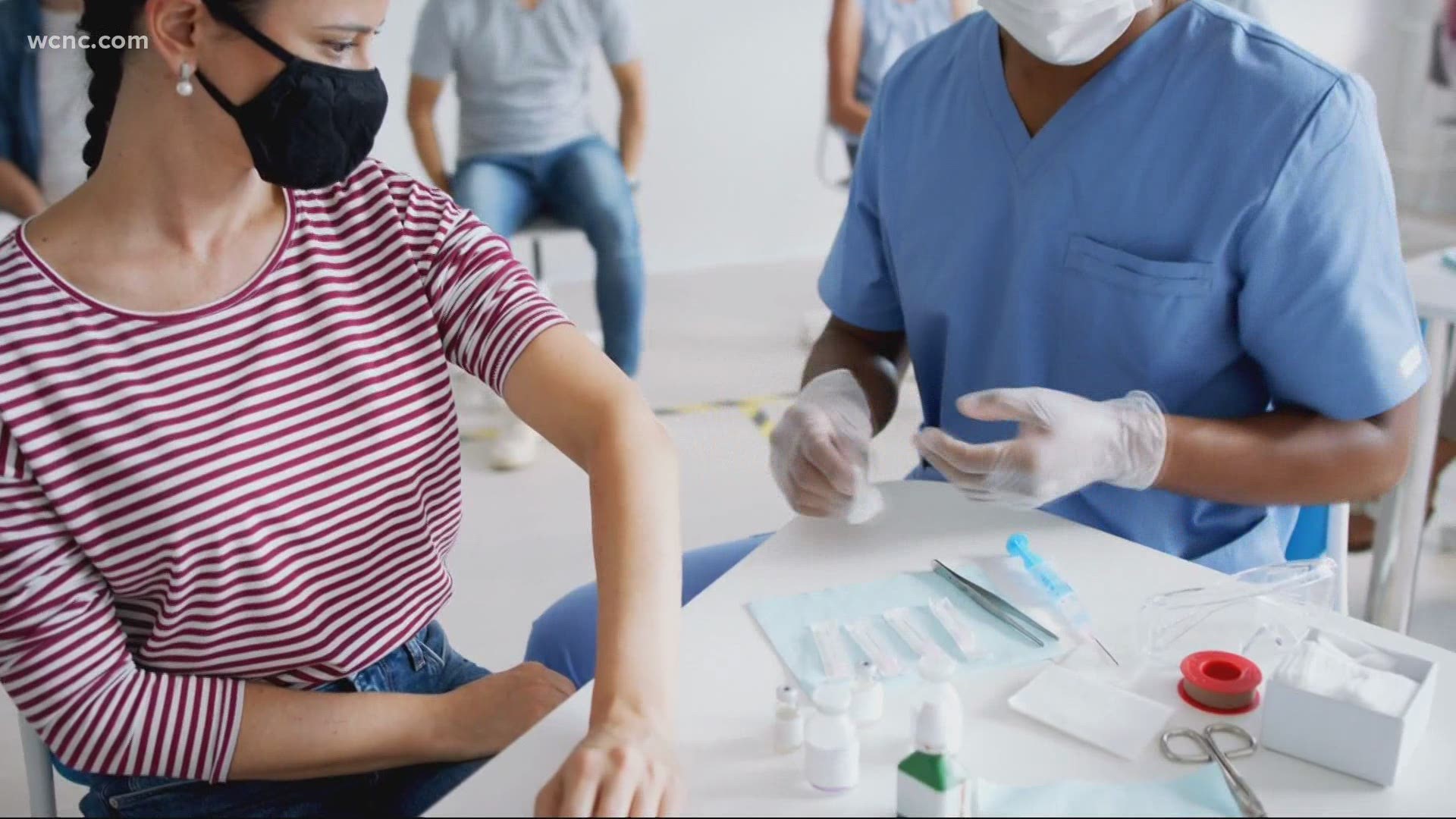ROCK HILL, S.C. — Nearly half of eligible Americans are now "fully vaccinated," meaning they have received two doses of either the Pfizer or the Moderna COVID-19 vaccine - or one shot of the Johnson and Johnson vaccine.
Both the mRNA vaccines from Pfizer and Moderna are roughly 95% effective in preventing hospitalizations from the original COVID-19. Their vaccine effectiveness against the delta variant of the coronavirus is 80%.
The Johnson and Johnson vaccine is believed to be 71% effective in preventing hospitalizations, according to an early study from South Africa.
Even though vaccines cannot completely prevent all infections, and a small number of patients may still become what is known as breakthrough cases, the goal of the vaccine is to lessen the chance of hospitalization or death.
A person needs two mRNA shots from Pfizer and Moderna, given weeks apart, to get the full level of antibody protection. The Johnson and Johnson vaccine requires only one shot. Someone is considered "fully vaccinated" two weeks after either their second mRNA shot or their single J&J shot.
Starting in September, U.S. health officials plan to offer COVID-19 booster shots to anyone who received their last coronavirus vaccine dose more than eight months prior. The booster shots, which reinforce immune protection, are similar to existing booster shots for tetanus or the seasonal flu.
Is there a difference between dose one and dose two of the currently approved COVID-19 vaccines?
THE ANSWER: The first dose and second dose of your Pfizer or Moderna COVID-19 vaccine should be exactly the same, both chemically and from a dosage standpoint.
According to the manufacturer's instructions for the two approved vaccines, Pfizer and Moderna, doses must be spaced apart.
For Pfizer, it's three weeks between doses. For Moderna, it's one month.
However, each manufacturer only provides one set of instructions, with no difference in directions between dose one and dose two.
Moderna's instructions read: "The Moderna COVID-19 Vaccine is administered intramuscularly as a series of two doses (0.5 mL each) 1 month apart."
Pfizer's instructions read: "The Pfizer-BioNTech COVID-19 Vaccine is administered intramuscularly as a series of two doses (0.3 mL each) 3 weeks apart."
Dr. Brannon Traxler, the Public Health Director with South Carolina's Department of Health and Environmental Control, confirms there is no difference between the two doses.
"They are exactly the same, in terms of the chemical makeup, but what they do and their function is a little bit different," Traxler said in January.
Traxler states the function of dose one is that of a primer.
"It gets (the immune system) ready and gets it started -- so, making antibodies and producing that immune response," Traxler said. "Then, the second dose --which again, in the syringe is identical -- but it is a booster. It boosts your immune system's response to more significantly produce antibodies."
Are booster shots the same as a third COVID-19 shot?
The FDA authorized a third COVID-19 shot for some immunocompromised people in August to help boost their immune responses to the COVID-19 virus as the highly transmissible delta variant spreads rapidly across the United States.
The CDC defines an immunocompromised individual as someone with a weaker or weakened immune system, caused by a medical condition or treatment, among other reasons.
When an extra dose of vaccine is given to someone with a healthy immune system is called a booster shot, according to Dr. William Schaffner, a professor at the Vanderbilt University School of Medicine in Nashville, Tennessee. When it is given to someone with a weakened immune system, it is called an additional dose within a regular vaccine series.
Can vaccinated people spread COVID-19?
Numerous experts worldwide and the Centers for Disease Control and Prevention have warned that people without coronavirus symptoms could still transmit the virus, which explains why the pandemic has been so hard to contain.
Maria Van Kerkhove, the World Health Organization’s technical lead on COVID-19, stressed there's a big difference with asymptomatic spread, where a person never shows symptoms, and a person being "presymptomatic," where they transmit the virus before developing mild symptoms.
Is the vaccine FDA approved?
On August 23, 2021, the FDA approved the first fully authorized COVID-19 vaccine from Pfizer. The vaccine, which has been known as the Pfizer-BioNTech COVID-19 Vaccine, and will now be marketed as Comirnaty for the prevention of COVID-19 disease in individuals 16 years of age and older. The same Pfizer vaccine remains under emergency use authorization (EUA) for children between 12 and 15 years of age.
Who is eligible for the COVID-19 vaccine?
The Moderna COVID-19 vaccine is available to anyone 18 years of age and older under emergency authorization.
The Johnson and Johnson vaccine, also known as the Janssen vaccine, is available to anyone 18 years of age and older.
Vaccine trials are underway for children 11 years of age and younger.

